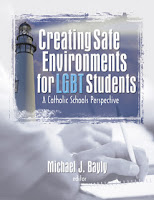Star Tribune columnist Nick Coleman has weighed in on Coadjutor Archbishop John Nienstedt’s recent comments on homosexuality.In writing his op-ed for today’s issue of the Star Tribune, Coleman interviewed two friends of mine, Mary Lynn Murphy and Brian McNeill. He also interviewed St. Paul/Minneapolis Archdiocese spokesperson Dennis McGrath, who attempts one of the lamest and most nonsensical clarifications I’ve ever heard.
Actually, I feel sorry for McGrath. It must be the job from hell to be the spin doctor for the regime being ushered in by John Nienstedt. I’ve spoken to a number of people working within the archdiocese - including priests. Morale is at an all time low.Anyway, following is Coleman’s commentary, which, as of 8:30 this morning, is one of the newspaper’s most e-mailed stories of the day!_______________________________
Future Archbishop’s Compassion Stops Short When it Comes to Gays
By Nick Coleman
Star Tribune
November 27, 2007
John Nienstedt, Coadjutor Archbishop of the Catholic Archdiocese of Saint Paul and Minneapolis, has been quoted as saying he believes homosexuality is the result of some kind of childhood trauma. Today, he is inflicting trauma of his own.That’s the opinion of many Catholic friends and relatives of gay and lesbian people in the Twin Cities. They say they have been wounded and angered by comments Nienstedt made about homosexuals in the Nov. 15 edition of The Catholic Spirit, the official newspaper of the archdiocese.“Those who actively encourage or promote homosexual acts or such activity within a homosexual lifestyle formally cooperate in a grave evil,” wrote Nienstedt, who is scheduled to succeed retiring Archbishop Harry Flynn in May. “If they do so knowingly and willingly, [they] are guilty of mortal sin.”Nienstedt went on to set three conditions for such church members to receive communion: They must experience a “conversion of heart,” express “sorrow for their action” and receive absolution from a priest.His views, a church spokesman said, merely reflect Catholic teachings as delineated in The Catechism of the Catholic Church which also requires individual homosexuals to be accepted with “respect, compassion and sensitivity.”The catechism, in my reading, says homosexual acts cannot be approved but does not label them a “grave evil.” Homosexuals, like all baptized persons, are “called to chastity.” But somehow, the sins of homosexuals always get denounced before the sins of straight people. And if gays must be accepted with compassion and respect, those qualities seem notably missing from Nienstedt’s statement.“He’s the only archbishop in the country to put this aggressive of a spin on Catholic teaching,” says Mary Lynn Murphy of Catholic Rainbow Parents. “We knew he was very conservative, but people had hoped that he wanted to bring people together. Then, right out of the chute, he fired this cannon. It’s extreme talk, and it gives license not just to homophobia but even to violence. This bishop says gays are ‘evil.’”Dennis McGrath, a spokesman for the archdiocese, said Nienstedt’s comments were not aimed at families of gays, or at individual homosexuals.“It was about the sin, the activity – not the person,” McGrath said. “He didn’t mean you must stop loving your child. But if you say, ‘Why don’t you go hit the gay bars tonight? . . . ’ He was talking about those who encourage or promote homosexual activities, like a pornographer might.”But as Nienstedt prepares to succeed Flynn, who tried to steer a less confrontational course, gay Catholics and their families are feeling more and more isolated.“It’s getting worse and worse,” says Brian McNeill of Dignity Twin Cities, a group of gay Catholics who have been pushing for acceptance in the church. “They want us to go away, to make the church so hostile for the gay and lesbian community that we won’t want to be there anymore.“And it is working.”Maybe so, but McNeill and other members of the extended GLBT family in the church aren’t giving up yet.This Sunday, they plan to hold a 2 p.m. vigil on the steps of the Cathedral of St. Paul to demonstrate against Nienstedt’s comments, and to deliver an open letter to the Chancery, across Summit Avenue from the Cathedral.For Mary Lynn Murphy, who has been cursed, spat at and manhandled by good churchgoers in the past as she demonstrated on behalf of her grown gay son, it is important to speak up and show up.“It is a human right to express your sexuality,” says Murphy, who met last week with Catholic parents of gays who were in tears over Nienstedt’s statements on homosexuality.“They are being tormented by a church that is driving a wedge between parent and child,” Murphy said. “They believe they are being asked to choose between loving their church and loving their child. And they are furious. For the most prominent religious leader in the state to use that kind of language, well, it brings shame on him.”To read Nick Coleman’s commentary on the Star Tribune website, click here.______________________________
December 4 Update: In the past few days there have been a number of letters-to-the-editor in response to Nick Coleman’s November 28 Star Tribune commentary.Following is a selection of these letters.A higher standardThank you, Nick Coleman, for your Nov. 28 column speaking out on behalf of Catholic homosexuals and their families in the Archdiocese of St. Paul-Minneapolis. While deeply troubled with the incoming archbishop’s editorial on homosexuality, I am amazed and humored at the comments of archdiocesan spokesman Dennis McGrath about the gay bars.I have, on occasion, joined friends at the Gay ’90s for a “social beverage”; and, being a church musician, I have also been in sacristies, rectories and choir lofts. Guess where I have experienced the most sexual advances?The Christian churches, including the Catholic Church, desperately need to reexamine their understanding of and teachings on human sexuality. It’s time for biblical scholars and sacramental theologians – men and women – from a diversity of disciplines to take a step out of the 16th century and dare to listen to the Holy Spirit speaking to the churches in the Third Millennium. As human beings, all made in the image and likeness of God, we need to stand together and call our religious leaders to a higher standard of compassionate leadership.Lalonne MurphyBloomington
November 30, 2007
Children firstIf the institution of the Catholic Church had been half as concerned about the safety of children over the years as it is about the sex lives of consenting adults, perhaps our whole society would be better off. It amazes me that an institution that has behaved with criminal recklessness and negligence for decades would dare to lecture anyone about his or her personal morality, and it amazes me even more that anyone would listen.I suggest that the archbishop remove the log from his own eye before he worries about the speck in others’.Mike BaileyMinneapolis
November 30, 2007
Archbishop respondsIn a Nov. 28 column, Nick Coleman accuses me of not being compassionate toward friends and relatives of persons with same-sex attractions. I vigorously deny the charge. For 13 years I prepared priesthood candidates for celebrating the Sacrament of Penance by counseling them to welcome persons with warmth, compassion and understanding. Anyone who has celebrated that same sacrament with me knows I follow my own advice.What Coleman wants is for the church I represent to be accepting and compassionate toward homosexual acts and lifestyles. And that can never be.Coleman further claims the Catechism of the Catholic Church does not say that homosexual acts are a “grave evil.” What it does say is the following: “Basing itself on Sacred Scripture, which presents homosexual acts as acts of grave depravity (Genesis 19: 1-29, Romans 1: 24-27, 1 Corinthians 6: 10, 1 Timothy 1:10), tradition has always declared that ‘homosexual acts are intrinsically disordered.’ . . . Under no circumstances can they be approved.”As a priest and bishop, I have the responsibility before God and in the name of Jesus Christ to call all men and women to conversion, the first step of which is recognizing sinful activity for what it is. Sometimes that is not a comfortable thing to do, but it is always the compassionate thing to do.John C. NienstedtSt. PaulCoadjutor ArchcbishopArchdiocese of St. Paul and Minneapolis
November 30, 2007
Picking and choosingIn his Nov. 30 letter to the editor, Coadjutor Archbishop John Nienstedt cites four verses from the Bible and concludes that “homosexual acts are intrinsically disordered and under no circumstances can they be approved.” Well, the Bible has much to say about divorce as well. Are the Catholic Church’s grounds for granting an annulment consistent with what the Bible has to say? The church is picking and choosing what it wants to uphold in the Bible.Mark BisignaniMinneapolis
November 30, 2007
What would Jesus say?Did any other reader notice that in Archbishop Nienstedt’s response to Nick Coleman’s Nov. 28 column regarding the church’s and the archbishop's lack of compassion toward gays, none of Nienstedt’s biblical references included a direct statement by Jesus?There of course is a reason for that, leaving open the question: What would Jesus say? Many of us Christians faithfully believe that Jesus would be open, and, yes, compassionate and accepting toward his homosexual brethren.Howard HerbstMinnesota Lake
November 30, 2007
What compassion?It would be much easier to have patience with the Catholic Church’s official stance on homosexuality if one were to see evidence of its caring and acceptance.We know that about 10 percent of our children are not heterosexual. Where is the church when it’s time to teach them how to handle the challenges of that compassionate “call to celibacy”? If adult seminarians, who choose celibacy, are supported in that difficult decision, why doesn’t the church provide support for our children who enter puberty and find out they’re not heterosexual?It’s pretty hard to believe in caring and acceptance when the real message is “Don’t tell! Hide or leave!” Quoting St. Paul is easy; taking real action to help real human beings is much tougher.Furthermore, it’s time to stop saying “lifestyle.” If we mean “promiscuity,” let’s say that. I think we could achieve general agreement that promiscuity harms people. Sincere, adult, committed relationships strengthen people, regardless of the sexual identities God gave them. Mary HudsonNew Hope, MN
December 4, 2007See also the previous Wild Reed posts:
An Open Letter to Archbishop Nienstedt
Archbishop Nienstedt’s “Learning Curve”: A Suggested Trajectory
No Place for Dialogue in Archdiocesan Newspaper
When Quackery Goes Mainstream
Interesting Times Ahead
Monitoring Nienstedt
Choosing to Stay
Local Archdiocese’s Misstep Makes National News

































